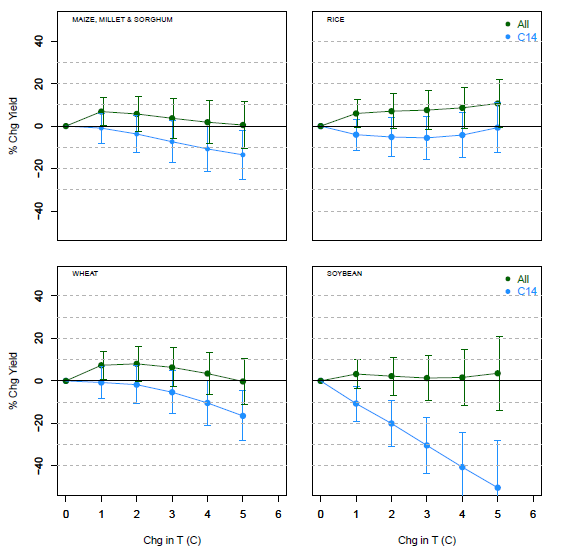Sensible people consider the whole idea of a “Social Cost of Carbon” (SCC) to be little more than hocus pocus designed to justify ever more regulations and taxes. After all, when scientivists tell us the SCC is, say, $50 per tonne, meaning that every tonne of CO2 emissions causes $50 worth of net harm to the world due to warming, are we really expected to believe those same scientivists would tell us that if CO2 were found to cause cooling instead of warming, each tonne would generate $50 worth of benefits? It’s not hypothetical; back when the fear was global cooling they really did blame burning fossil fuels. It’s all bad all the time. And predictably worse than scientists thought. Including that not long ago a team of alarmists told the Biden Administration the real costs are more like $200 per tonne, based mostly on what they claimed was a huge new data set on the harm from CO2-driven warming on global agriculture. Unfortunately no one checked their math until University of Guelph economist Ross McKitrick decided to take a look. And he found they left out a lot of data, especially the part showing how CO2 benefits crops. In a new peer-reviewed paper he shows that when he re-did the analysis using all the data the results reversed, leading him to conclude: “While the original smaller data set implies yield declines of all crop types even at low levels of warming, on the full data set global average yield changes are zero or positive even out to 5 °C warming.” Oops. And the scientivists rushed not to tell you, didn’t they?
The data in this case is not like the experimental data we report each week from the CO2Science archive, where people take actual plants and expose them to actual CO2 increases and see what actually happens. Instead the data underlying the SCC claim was from an earlier study in 2014, which was a review of about 1700 … wait for it… computer simulations from crop models. Even so the 2014 study reported that the benefits of CO2 fertilization would offset any negative effects from warming. Which will never do. So a 2017 study took the same data and ran it through a different statistical model and got very different results, namely that crop yields around the world would start declining even at low levels of warming.
It seemed odd. So McKitrick got the data from one of the authors and right away noticed that half of the CO2 change measurements were missing. So he began digging into the underlying sources and was able to recover several hundred missing entries. When he put them into the analysis, the crop losses turned into gains right across the board:

In these charts the blue lines are the yield change projections using the incomplete data set and the green lines are the projections using the full data set. (With the circles being the average and the lines with flat tops and bottoms the “error bars”, aka range of uncertainty.) Amazing, isn’t it? Instead of declines in maize, rice, wheat, soybean and other crops, the combination of extra CO2 and warmer temperatures is a net benefit.
This finding won’t come as a surprise to CDN readers. But it does shows on scientific evidence-based grounds that the Biden Administration’s hike in the SCC was scientifically unjustified.
In a blog write-up at Judith Curry’s Climate Etc. commenting on his new research and what it means for SCC estimation, McKitrick writes that this episode also exposes a problem in the way bureaucracies handle science:
“Ultimately the SCC is determined by the political and social process of choosing who gets to write the report. The Biden-era SCC report was written by people whose antennae were up for any reasons whatsoever to boost the SCC estimate, and who ignored evidence pointing in the other direction... The scientific establishment has resisted all attempts to fix climate assessment processes because they always got to pick the authors. But now a very different team is going to do the picking. If the establishment grandees suddenly decide they don’t like the process, they should have said something sooner.”
The bottom line is CO2 is good for crops, as sensible people always knew. And that scientivists do strange things with data in the presence of it.


